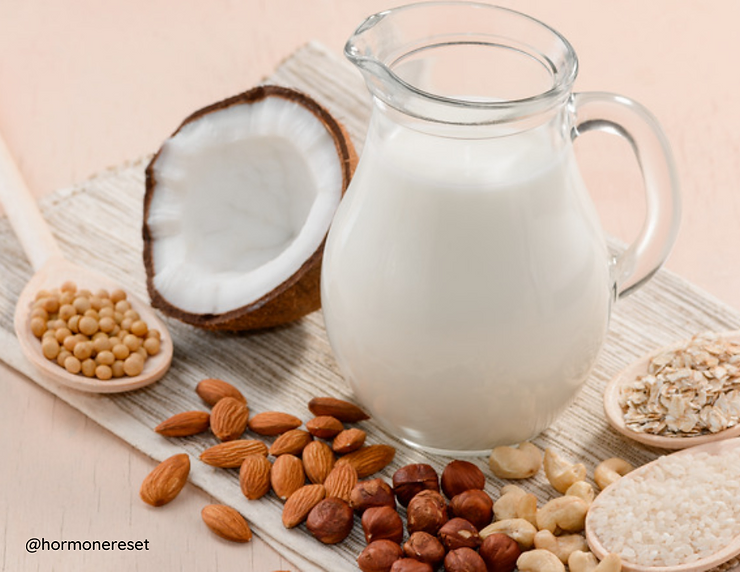What is Vegan Milk?
Vegan milk, also known as plant milk or non-dairy milk, is a beverage that has been consumed for centuries in various parts of the world for various reasons. Some choose to drink it due to health concerns such as an allergy or lactose intolerance, while others drink it for the nutritional benefits it offers.
A lactose-free substitute to cow milk, plant-based milk or vegan milk is usually made from almond, coconut, cashew, oats and hemp.
A dairy-free diet helps our body and overall health in various ways such as improving digestion, promoting weight loss, improvement in metabolism and energy levels and does not cause any inflammation that might cause the expansion of unhealthy gut bacteria linked to some chronic diseases or conditions including leaky gut. Plant-based milk is rich in vitamins and minerals, and low in calories. It is also advised to people that have a slow gastrointestinal system.
Different types of Plant based / Vegan milk:
Almond Milk

Almond milk is presumably the foremost popular plant-based milk. Although this vegan milk may be low in protein, it contains a lot of vitamins and other nutrients such as Copper, zinc, iron, magnesium, vitamin E etc. Almond milk is rich in various antioxidants which may help protect against numerous ailments such as cancer and heart disease etc. Unsweetened almond milk is low in calories and is low in carbohydrates. Almond milk is a great beverage that you can drink as it is or in smoothies, shakes and coffees. It can also be poured over cereals and oatmeal.
How to Prepare:
- Soak the almonds in water overnight.
- Place the soaked almonds during a blender.
- Add water and start blending. Start at low speed and gradually increase to high. Blend at high for up to 1.5 minutes.
- This mixture can be used as is. However, for a smoother texture, you can strain it through a muslin/cheesecloth or a fine sieve.
- The milk is ready for use. You can also refrigerate it and use it over the next 2-3 days.
Benefits of Almond Milk:
- It is rich in monounsaturated fatty acids (MUFA) which will aid in weight loss and weight management.
- It is a natural source of the antioxidant vitamin E.
- Almond milk doesn’t raise blood glucose levels, therefore, making it beneficial for people with diabetes.
Coconut milk

This milk is extracted from the white flesh of a coconut. Coconut milk features a pleasant flavor and has less protein than almond milk. In comparison to other plant-based milk types, coconut milk contains good amounts of beneficial medium-chain triglycerides that are beneficial for one’s overall health. It adds a delicious yet not too overpowering coconutty flavor to any dish it’s utilized in and works great when utilized in baking too. Coconut milk is ideal for many different kinds of recipes including thai curries, soups, stews, smoothies, puddings, and even ice creams. It is meant for drinking and has a thinner consistency that is ideal for teas, coffees, and cereals.
How to Prepare:
- Put the grated coconut in a blender jar and blend at high speed with 1-cup water.
- Strain with muslin or fine sieve and collect the first milk in a bowl. This is the thick milk.
- Transfer the coconut to the blender, add 1-cup water and again blend on high. Strain and collect this milk in another bowl. Do this process once more.
- The first milk can be used for making very tasty curds. For the first time a starter from normal curd can be added. Then let it sit in a warm area for 6-8 hours.
Benefits of Coconut Milk :
- It aids in weight loss.
- It contains an honest amount of antioxidants.
- It helps in balancing electrolytes.
- It prevents heart diseases by promoting the HDL (good) cholesterol levels and reducing the levels of harmful LDL (bad cholesterol) that are associated with cardiovascular diseases.
- It strengthens the immune system.
- It helps with good digestion.
- It’s common in South Indian and Thai cuisine because the curries get their creaminess from coconut milk.
Oats Milk

Oats milk is nutritious and contains soluble fiber. Enriched with vitamins and calcium, the milk features a low saturated fat content. The soluble fiber in it gives the milk a creamy texture and as compared to other sorts of plant-based milk, oat milk has the very best amount of calories and carbohydrates
How to prepare:
- Soak the rolled oats in water overnight or 3-4 hours.
- Place the soaked oats in a blender.
- Add water and start blending. Blend for up to 2-3 minutes.
- Strain it through a muslin or a fine sieve.
- The milk is ready to use
Benefits of Oats Milk:
- It is high in beta-glucans (a soluble fiber) which help lower blood cholesterol.
- Rich in calcium which boosts bone health.
- Excellent source of B-complex vitamins.
- The soluble fiber in oat milk helps slow digestion and keeps you feeling full for extended time.
- It also helps stabilize your blood glucose levels
Cashew Milk

Cashew milk is a very recent addition to vegan milk. It is crammed with heart-healthy unsaturated fats and should be beneficial for those that are diabetic and wish to observe their carbohydrate consumption. This vegan milk features a very creamy consistency that works great in teas and coffees. It is a good addition to your curries and bakery products.
How to prepare:
- Soak the cashews overnight. Place the soaked cashews in a blender.
- Add water and start blending. Start at low speed and gradually increase to high. Blend at high for up to 2 minutes.
- The milk is ready for use. It can be stored in the refrigerator and used over the next 2-3 days.
Note – Cashew milk does not need to be strained or filtered as it naturally has a creamy smooth texture.
Benefits of Cashew milk:
- Contains healthy fats and a spread of vitamins and minerals.
- Boosts overall health.
- Helps reduce bloating.
- Improves eyesight.
Hemp Milk

Hemp milk is milk made using seeds of the hemp plant. This vegan milk is sort of high in protein with a thick and creamy consistency. It is high in minerals and healthy fats, also as low in calories. Hemp milk provides almost 50 percent of the recommended daily intake of alpha-linolenic acid (ALA), which is a type of omega-3 fatty acid that is important in healthy heart and brain function. Due to its strong flavor, it is best used in savoury dishes.
How to Prepare:
- Soak hemp seeds overnight.
- Place-soaked hemp seeds in a blender and blend until smooth.
- Add a few drops of pure vanilla extract or sweetener if needed.
- Strain the milk if needed.
- Serve immediately.
- It can be refrigerated in an airtight glass container up to 5 days.
Benefits of Hemp Milk:
- It contains arginine, which produces nitric acid in the body. This improves your heart health. Hemp seeds also contain an honest amount of fiber, which may aid in healthy digestion and reduce your risk of diabetes.
- Hemp milk contains a high amount of omega 3 & omega 6 fatty acids. Hence boost brain function and reduce risk for Alzheimer’s. It improves skin health too.
- It acts as an anti-inflammatory.
- Hemp milk strengthens the immune system as well.
Swapping out dairy milk for plant-based milk is not just beneficial for health but also prevents your exposure to antibiotics and hormones in conventional dairy products. High quality plant-based milk is rich with fiber, omega 3 and protein to help humans live their healthiest life.
References :
- Vanga, S. K., & Raghavan, V. (2018). How well do plant based alternatives fare nutritionally compared to cow’s milk?. Journal of food science and technology, 55(1), 10–20. https://doi.org/10.1007/s13197-017-2915-y
- Reyes-Jurado, F., Soto-Reyes, N., Dávila-Rodríguez, M., Lorenzo-Leal, A., Jiménez-Munguía, M., Mani-López, E., & López-Malo, A. (2021). Plant-Based Milk Alternatives: Types, Processes, Benefits, and Characteristics. Food Reviews International, 1–32. https://doi.org/10.1080/87559129.2021.1952421
Share





Leave a Reply